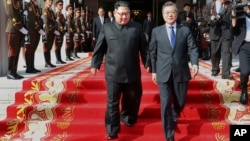美韩在朝鲜非核化问题上显现分歧
韩国加强与朝鲜接触之际,美国和韩国在如何实现朝鲜半岛非核化的问题上看来出现越来越大的分歧。
一些分析人士认为, 韩国推动与朝鲜的一系列经济活动,目的是缓和半岛南北关系,而美国强调必须继续保持对朝鲜的国际制裁的最大严厉。
韩国总统文在寅在纪念朝鲜摆脱日本35年的占领73周年的实况转播电视讲话中呼吁韩国各界关注韩国政府通过和解及经济项目改善与朝鲜关系的计划。
文在寅援引韩国一家官方机构的研究结果强调,朝鲜半岛南北经济合作预计在今后30年带来至少624亿美元的价值。
不过,美国仍然持谨慎立场。美国国务院说,韩朝关系的改善应该与半岛非核化挂钩。
美国认为,必须通过国际制裁维持对朝鲜的最大压力。
US, South Korea growing apart on how to denuclearize North Korea
As South Korea extends its engagement with North Korea, there appears to be a widening rift between Washington and Seoul over how to achieve North Korea’s denuclearization.
South Korea is pushing a series of economic undertakings with North Korea with the goal of improving inter-Korean relations, according to analysts, while Washington is stressing the need for continuing the maximum pressure campaign of international sanctions on Pyongyang.
In a lively televised speech anniversary of the Korean liberation from 35 years of Japanese occupation, South Korean President Moon Jae-in called the nation’s attention to the government’s plans to improve relations with the North through reconciliation and economic projects.
Moon stressed that the revenue from inter-Korean economic cooperation is "estimated to reach 70 trillion won at a minimum over the next 30 years," citing research by a state-run organization. The amount is equivalent to approximately $62.4 billion.
However, the U.S. remains cautious, and in response to the upcoming summit, the State Department said the progress of inter-Korean developments should be tied to denuclearization.
Washington also stressed the need for maintaining the maximum pressure on North Korea through international sanctions.
彭斯副总统重申美国在太空占主导地位计划但没有提供新细节
美国副总统彭斯星期四在德克萨斯州休斯顿重申了川普行政当局在2020年之前建立一支太空部队、再次将美国宇航员送上月球并着眼于探索火星以及其它星体的计划。
彭斯副总统在休斯顿的美国国家航天航空局约翰逊太空中心的讲话中说,五角大楼最近的报告显示,中国正在“大力发展太空武器”,俄罗斯也在研发“抗衡美国太空能力”的武器。
彭斯说,国防部正在努力“加强美国的太空安全”,联邦政府将与国会共同努力确保得到建立太空军的资金和授权。太空军将是美国武装力量中一个新的独立军种。
彭斯副总统还说,原先称为“深空门户”月球轨道平台计划正在从建议阶段转向实施。
美国政府负责太空探索的航天航空局与若干合作伙伴一道制定建立环月太空站的计划。这个太空站将作为月球开发的立脚点,同时具备开发太空门户站的若干功能,包括一个推进系统、宇航员住处和与航空器对接的能力。
美国国家航天航空局在2019年的预算案中要求为这个项目获得5亿零400万美元的拨款,目前还有待国会批准。
彭斯副总统除了强调川普行政当局在太空保持美国主宰地位的设想以外没有提供细节。
彭斯在几个场合提到了川普总统经常提到的太空军。川普总统星期二在西维吉尼亚州查尔斯顿的一个竞选集会上讲话时也提到太空军。
川普总统最早今年6月在白宫提出建立太空军的想法。他宣称要重新建立美国在太空的领先地位,称之为国家安全问题。川普总统说,他不想让“中国、俄罗斯和其它国家超越美国”。
Pence Reaffirms Vision for 'American Dominance in Space' but Offers No New Details
Vice President Mike Pence is in Houston, Texas, Thursday to reaffirm the Trump administration’s plans to establish an American Space Force by 2020, return Americans to the moon, and set its sight on Mars and beyond.
During a speech at NASA's Johnson Space Center, Pence said that recent Pentagon reports have shown that China is "aggressively weaponizing space" and that Russia is developing weapons to "counter America’s space capabilities."
Pence said the Department of Defense is moving forward to "strengthen American security in space" and that the administration will work with Congress to secure funding and authorization to establish Space Force as a new and separate branch of the armed forces.
Pence also highlighted efforts to move the Lunar Orbital Platform, formerly known as the Deep Space Gateway, from proposal phase to production.
NASA, the main U.S. agency for space exploration, and several of its partners, have been developing plans for this lunar-orbit space station that would be used as a staging point for lunar exploration and would have several gateway-to-space features, including a propulsion system, a habitat for the crew, and docking capability.
There is little new detail in Pence's speech other than reiterating the administration’s vision for "American dominance in space."
Space Force has been mentioned by Pence on several occasions, and a theme that President Donald Trump often returns to, including during his rally in Charleston, West Virginia, on Tuesday.
Trump first announced the creation of Space Force at the White House in June. He pledged to reclaim U.S. leadership in space, framing it as a national security issue, and saying he does not want "China and Russia and other countries leading us."




